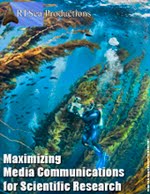 The growth of Nanotechnology - the science of developing compounds at an extremely small, molecular level - has brought some interesting developments, from new pharmaceuticals to our odor-eating, anti-bacterial socks. But with the emergence of this new field there also has grown concerns that it might turn out to be a substantially sharp two-edge sword.
The growth of Nanotechnology - the science of developing compounds at an extremely small, molecular level - has brought some interesting developments, from new pharmaceuticals to our odor-eating, anti-bacterial socks. But with the emergence of this new field there also has grown concerns that it might turn out to be a substantially sharp two-edge sword.Many of these new nano-compounds can enter the environment and scientists are just beginning to see the implications. When these compounds enter aquatic ecosystems, the impacts may appear very subtle at first because the components of the ecosystem affected are they themselves quite small. Scientists are looking at the effects of nano-compounds like various metals or carbon-based particles on aquatic bacteria, algae, and small fish.
As an example, one recent study indicated that "carbon black nanoparticles" affect the fertilization of brown algae. And there is concern that the silver nanoparticles used as an odor-remover in socks can, when released through machine washing, impact the bacteria that is necessary in breaking down organic matter - a very important function in water treatment facilities, lakes, rivers, and oceans. When any aquatic system loses its ability to consume organic matter, you are looking at a major and probably fatal disruption of the entire balance of the ecosystem.
 While we focus on aquatic pollutants that are more visible - like plastics, crude oil, and discharged chemicals, we must also hold commercial science responsible for the effects of even the smallest of compunds that are entering the water, land, and air. I have great faith in science, but whether for commercial or purely research purposes, it must be held to the highest standards in balancing the rewards versus the impact on the planet.
While we focus on aquatic pollutants that are more visible - like plastics, crude oil, and discharged chemicals, we must also hold commercial science responsible for the effects of even the smallest of compunds that are entering the water, land, and air. I have great faith in science, but whether for commercial or purely research purposes, it must be held to the highest standards in balancing the rewards versus the impact on the planet.
















No comments:
Post a Comment